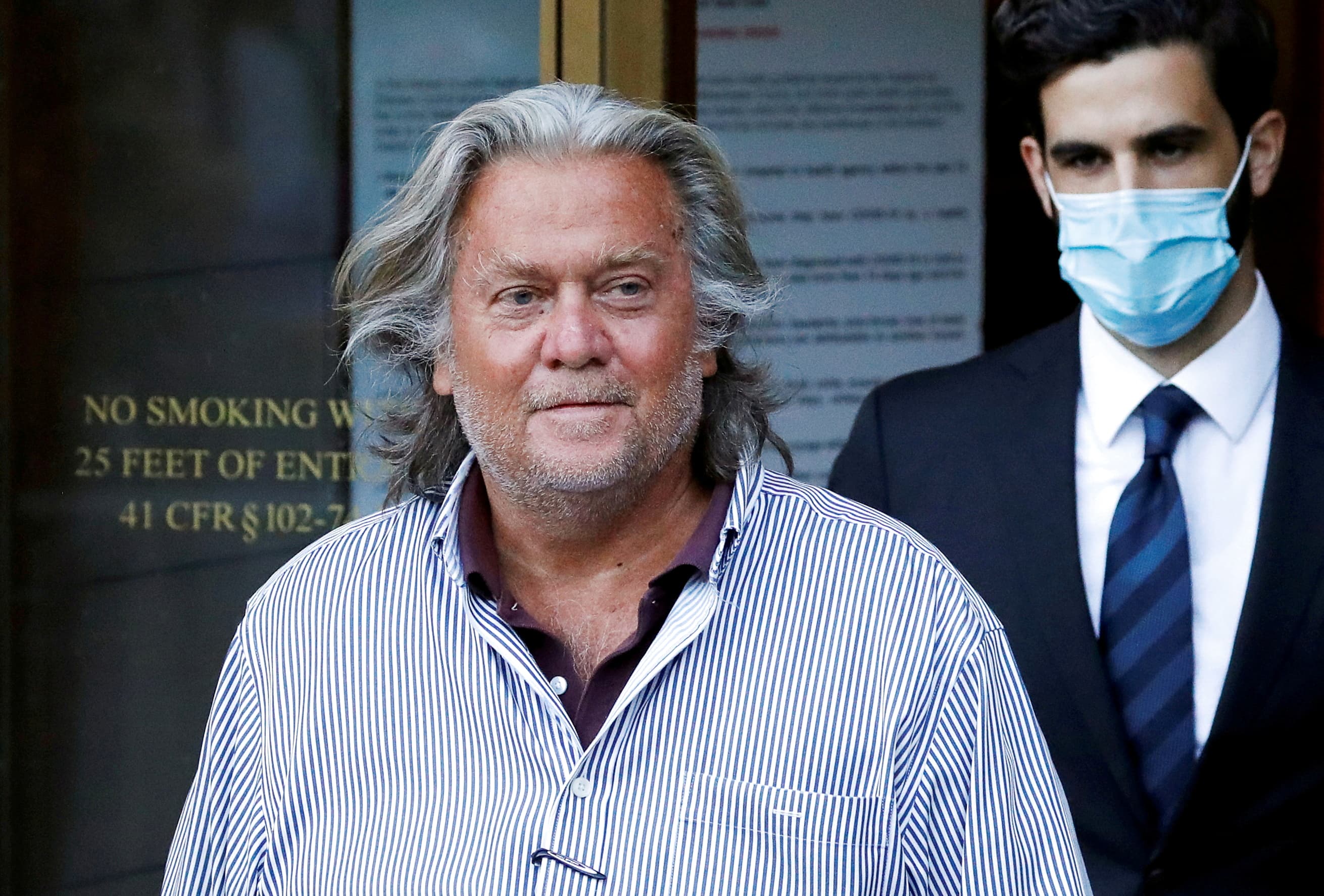
The select committee investigating the deadly Capitol riot voted Tuesday evening to advance criminal contempt proceedings for Steve Bannon after the onetime advisor to former President Donald Trump refused to comply with a subpoena.
The unanimous vote will send the resolution recommending contempt for Bannon to the full House for consideration.
“Preserving our Constitution and the rule of law is a central purpose of this investigation. The plain fact here is that Mr. Bannon has no legal right to ignore the committee’s lawful subpoena,” said the select committee’s vice chair, Rep. Liz Cheney, R-Wyo., before the vote.
The vote came one day after Trump filed a lawsuit aiming to block the committee from obtaining records related to the Jan. 6 invasion, where hundreds of his supporters stormed the Capitol and forced lawmakers to evacuate their chambers.
An attorney for Bannon had asked select committee Chairman Bennie Thompson, D-Miss., on Monday to delay the contempt report vote by one week in light of the former president’s new lawsuit. Thompson refused.
The nine-member committee, comprising seven Democrats and two Republicans, convened around 7:30 p.m. ET for the vote to advance the contempt report.
“It’s a shame that Mr. Bannon has put us in this position,” Thompson said before the vote. “But we won’t take ‘no’ for an answer.”
Thompson stressed that among the dozens of witnesses contacted by the committee, Bannon is the only one to completely defy his subpoena.
“No one in this country, no matter how wealthy or how powerful, is above the law,” Thompson said. “There isn’t a different set of rules for Mr. Bannon. He knows this. He knows there are consequences for outright defiance. And he’s chosen the path toward criminal contempt by taking this position.”
“If there’s no accountability for these abuses — if there are different sets of rules for different types of people — then our democracy is in serious trouble,” Thompson said.
In her own remarks, Cheney took aim at Trump’s assertion that many of the materials sought by the committee are protected by executive privilege. Bannon’s attorney cited Trump’s claims of privilege as the basis for his refusal to comply with the subpoena.
“There is no conceivably applicable privilege that could shield Mr. Bannon from testimony on all of the many other topics identified in our subpoena,” Cheney said.
But “Mr. Bannon’s and Mr. Trump’s privilege arguments do appear to reveal one thing,” Cheney added. “They suggest that President Trump was personally involved in the planning and execution of January 6th. And we will get to the bottom of that.”
The contempt report
Bannon had “specific knowledge about the events planned for January 6th before they occurred,” the panel’s contempt report says. The 26-page document cites news stories and Bannon’s own words, including his claim on Jan. 5 that “all hell is going to break loose tomorrow.”
The report also addresses the claims of executive privilege asserted by Trump, and cited by Bannon, to block the committee’s requests for information.
“[A]lthough the Select Committee is confident that such claims could not bar any of its requests, there is no conceivable executive privilege claim that could bar all of the Select Committee’s requests or justify Mr. Bannon’s flat refusal to appear for the required deposition,” the report says.
The report also recommends that the House find Bannon in contempt of Congress. After the report is adopted, it will be sent to the chamber for a vote, the committee said. If approved, House Speaker Nancy Pelosi, D-Calif., will certify it to the U.S. attorney for Washington, D.C., who will then bring the matter before a grand jury.
Contempt of Congress is punishable by up to 12 months in jail and a fine of up to $100,000, according to the report.
Privilege problems
Trump attempted to assert executive privilege to withhold some of the documents sought by the committee, but President Joe Biden’s administration refused to back that claim, prompting Trump to file suit.
“President Biden does not uphold the former President’s assertion of privilege,” Biden’s counsel Dana Remus wrote to U.S. Archivist David Ferriero.
Robert Costello, Bannon’s attorney, had leaned on Trump’s privilege claims when explaining Bannon’s refusal to cooperate with the probe by producing documents and sitting for a deposition.
In a letter to the committee, Costello cited a message from Trump’s counsel Justin Clark, who instructed Bannon not to produce any documents or testimony “concerning privileged material” in response to the subpoena.
″[W]e must accept [Trump’s] direction and honor his invocation” of it, Costello wrote in the letter, adding, “We will comply with the directions of the courts, when and if they rule on these claims of both executive and attorney client privileges.”
The panel has flatly rejected the privilege argument from the former president and from Bannon, who departed the Trump administration years before the Capitol riot.
Trump’s lawsuit “is nothing more than an attempt to delay and obstruct our probe. Precedent and law are on our side. Executive privilege is not absolute and President Biden has so far declined to invoke that privilege,” Thompson and Cheney said in a statement Monday evening.
“Additionally, there’s a long history of the White House accommodating congressional investigative requests when the public interest outweighs other concerns,” they added.
“It’s hard to imagine a more compelling public interest than trying to get answers about an attack on our democracy and an attempt to overturn the results of an election.”
Former White House chief of staff Mark Meadows and former Defense Department official Kashyap Patel, two Trump associates who were also subpoenaed have been engaging with the probe, the committee said.
Their depositions, scheduled for last week, have been slightly postponed “as they continue to engage with our investigation,” a select committee aide told CNBC.




